|
|
|
Sort Order |
|
|
|
Items / Page
|
|
|
|
|
|
|
| Srl | Item |
| 1 |
ID:
168550
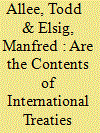

|
|
|
|
|
| Summary/Abstract |
Most accounts of international negotiations suggest that global agreements are individually crafted and distinct, while some emerging scholarship suggests a heavy reliance on models and templates. In this research, we present a comprehensive test of whether new international treaties are heavily copied and pasted from past ones. We specify several reasons to expect widespread copying and pasting, and argue that both the most and least powerful countries should be most likely to do so. Using text analysis to examine several hundred preferential trade agreements (PTAs), we reveal that most PTAs copy a sizable majority of their content word for word from an earlier agreement. At least one hundred PTAs take 80 percent or more of their contents directly from a single, existing treaty—with many copying and pasting 95 percent or more. These numbers climb even higher when we compare important substantive chapters of trade agreements, many of which are copied and pasted verbatim. Such copying and pasting is most prevalent among low-capacity governments that lean heavily on existing templates, and powerful states that desire to spread their preferred rules globally. This widespread replication of existing treaty language reshapes how we think about international cooperation, and it has important implications for literatures on institutional design, policy diffusion, state power, and legal fragmentation.
|
|
|
|
|
|
|
|
|
|
|
|
|
|
|
|
| 2 |
ID:
147315
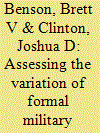

|
|
|
|
|
| Summary/Abstract |
Many critical questions involving the causes and consequences of formal military alliances are related to differences between various alliances in terms of the scope of the formal obligations, the depth of the commitment between signatories, and the potential military capacity of the alliance. Studying the causes and consequences of such variation is difficult because while we possess many indicators of various features of an alliance agreement that are thought to be related to the broader theoretical concepts of interest, it is unclear how to use the multitude of observable measures to characterize these broader underlying concepts. We show how a Bayesian measurement model can be used to provide parsimonious estimates of the scope, depth, and potential military capacity of formal military alliances signed between 1816 and 2000. We use the resulting estimates to explore some core intuitions that were previously difficult to verify regarding the formation of the formal alliance agreement, and we check the validity of the measures against known cases in alliances as well as by exploring common expectations regarding historical alliances.
|
|
|
|
|
|
|
|
|
|
|
|
|
|
|
|
| 3 |
ID:
130996
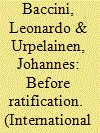

|
|
|
|
|
| Publication |
2014.
|
| Summary/Abstract |
When do international treaties cause domestic policy adjustments? While previous research emphasizes the consequences of treaty ratification, we argue that the need to secure entry into force can induce states to change their policies already before ratification. If a state expects benefits from a treaty, it can increase the probability of foreign ratification by implementing policies that benefit pivotal domestic players within its partner country. Accordingly, studies that focus on policy change after ratification underestimate the importance of treaties and partly misconstrue the causal connection between treaties and policies. We test the theory against data on the relationship between North-South preferential trading agreements (PTAs) and automobile emission standards, finding that developing countries adopt automobile emission standards between the signature and ratification of North-South PTAs.
|
|
|
|
|
|
|
|
|
|
|
|
|
|
|
|
| 4 |
ID:
148148
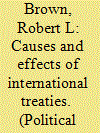

|
|
|
|
|
| Summary/Abstract |
ROBERT L. BROWN analyses the relationship between state interests and the likelihood of international cooperation. He argues that while divergent interests create demand for treaty negotiations, converging interest are required for treaties to enter into force.
|
|
|
|
|
|
|
|
|
|
|
|
|
|
|
|
| 5 |
ID:
157510
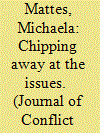

|
|
|
|
|
| Summary/Abstract |
Disputants might resolve their disagreements in a piecemeal fashion, addressing a subset of the issues at a time. How viable is such a strategy? I argue that partial settlements signal the desire to resolve disagreements and can lay the foundation for additional cooperation by building trust and/or demonstrating the benefits of dispute resolution. As a result, partial settlements should be associated with the resolution of remaining disagreements. Yet, scholars have questioned whether pursuing a piecemeal approach may be more harmful than helpful, and a systematic empirical test of these competing predictions is necessary. Using data from worldwide territorial claims between 1919 and 2001, I find a strong positive correlation between partial settlements and comprehensive dispute resolution. In the shorter run, partial settlements are also associated with an increased likelihood for peaceful negotiations, but there is only limited evidence that they reduce conflict before all aspects of the claim are resolved.
|
|
|
|
|
|
|
|
|
|
|
|
|
|
|
|
| 6 |
ID:
164158
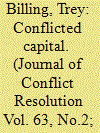

|
|
|
|
|
| Summary/Abstract |
Why do developing countries commit to costly international agreements? Massive arbitral awards and the discovery that rich countries write investment rules have led to a newfound appreciation of the costs of bilateral investment treaties (BITs). Yet, developing countries continue to sign them. This article advances a novel argument for why governments sign potentially costly agreements. We argue that civil conflict changes the decision calculus of governments by rendering them domestically insecure. This insecurity makes governments more willing to sign agreements, like BITs, that sacrifice future policy autonomy. BITs can attract foreign direct investment (FDI) and signal competence, which have important domestic political benefits. BITs are also attractive postconflict since they can be copied quickly from past templates and require few ex ante policy changes. Empirical tests of over 150 countries from 1960 to 2012 demonstrate that governments sign more BITs after civil conflict. Additional tests indicate that postconflict BITs increase FDI inflows, especially after devastating conflict. Our results provide a unique perspective on why governments cede sovereignty to international institutions.
|
|
|
|
|
|
|
|
|
|
|
|
|
|
|
|
| 7 |
ID:
119636
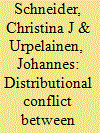

|
|
|
|
|
| Publication |
2013.
|
| Summary/Abstract |
Why do states ratify international treaties? While previous research has emphasized domestic political factors, we focus on power politics in situations in which powerful states disagree on the merits of a treaty. We argue that states supporting the status quo should discourage third parties from ratifying the treaty, whereas challenger states should entice them to do so. Based on this theory, we expect third parties' ratification decisions to be influenced by their dependence on the conflicting states. To test the theory, we use data on the conflict between the United States and the European Union over the regulation of trade in genetically modified organisms. The European Union created a new treaty, the Cartagena Protocol, to enhance biosafety regulation and propagate the "precautionary principle" over the "sound science principle" defended by the United States. Our quantitative analysis shows that ratification decisions of third parties were influenced by relations to and dependence on the clashing giants.
|
|
|
|
|
|
|
|
|
|
|
|
|
|
|
|
| 8 |
ID:
168278
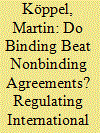

|
|
|
|
|
| Summary/Abstract |
Does the form of a multilateral agreement (MEA) by itself improve environmental performance? In particular, do legally nonbinding MEAs pose a rival to the effect of more traditional legally binding international agreements? Our theory builds on the legal and international regimes literatures and postulates that legally binding agreements (LBAs) have more benign effects on water quality than legally nonbinding agreements (LNBAs). We probe two operationalizations of the form of MEAs. First, we purely focus on the form: of legally binding versus legally nonbindings. Second, we combine the form of an agreement each with an index of precision and an index of delegation. The empirical focus is on upstream–downstream water quality in Europe during 1990 to 2007. Our regression analyses, regardless of specification, find that LBAs beat LNBAs and that LBAs with high degrees of precision and delegation beat the effect of any other configuration of agreements with respect to enhancing water quality.
|
|
|
|
|
|
|
|
|
|
|
|
|
|
|
|
| 9 |
ID:
169540


|
|
|
| 10 |
ID:
129583


|
|
|
|
|
| Publication |
2014.
|
| Summary/Abstract |
External action has been of growing importance for the Union's Area of Freedom, Security and Justice (AFSJ) and accounted in 2011 already for over 19 per cent of all texts adopted by the Justice and Home Affairs Council. AFSJ related external action has also added a new dimension to previously existing fields of EU external relations. This article first considers the internal and external factors which have influenced the development the external side of the AFSJ and the impact of the post-Lisbon legal and institutional framework, including the special context created by the 'opt-outs' and coherence problems within this framework. It then provides a survey and analysis of the main forms of EU action in this domain (strategy formulation, cooperation with third countries, capacity-building and cooperation with and within international organizations) before assessing-in the conclusions-the implications of this external dimension for both the EU and the Member States and its future developments prospects.
|
|
|
|
|
|
|
|
|
|
|
|
|
|
|
|
| 11 |
ID:
159253
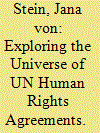

|
|
|
|
|
| Summary/Abstract |
The international human rights (HR) regime is vast and complex. Yet, most of what we know about it draws from a handful of agreements, often chosen for their prominence and/or perceived centrality to the HR project. This article argues that HR research needs to expand its scope to encompass all agreements in this realm, and presents a new data resource that enables scholars to accomplish that goal. Using the data, I demonstrate that the literature has painted an unrepresentative portrait of HR agreements. In addition to making comprehensive analysis possible, the database moves the literature forward by (1) taking into account important legal distinctions in the process of making treaties binding, (2) providing information on treaty design, and (3) considering relationships between agreements. I present several applications and discuss future areas of inquiry. Network analysis and the linking of treaty participation to HR outcomes are two notable areas of interest.
|
|
|
|
|
|
|
|
|
|
|
|
|
|
|
|
| 12 |
ID:
129584
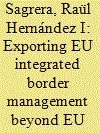

|
|
|
|
|
| Publication |
2014.
|
| Summary/Abstract |
The external dimension of European Union (EU) border management cooperation has recently been developed, in particular through the promotion of integrated border management (IBM). The European Commission has been keen to foster IBM, an attempt to reach EU standards in the absence of an EU common border service. Integrated border management is regulated under the Treaty of Lisbon, and the Stockholm Programme calls for its further development. This article analyses and compares the policy instruments promoting IBM standards beyond EU borders, namely the European Agency for Operational Cooperation at the External Border of the Member States of the EU (FRONTEX) (with the signature of Working Arrangements with the border services of third countries) and the activity of the EU Border Assistance Mission to the Republic of Moldova and to Ukraine (EUBAM) at the Ukrainian-Moldovan border. Moreover, it provides an empirical account of IBM activity carried out in the Eastern Partnership and Russia, and explains the reasons underlying the lack of IBM promotion in the southern Mediterranean countries.
|
|
|
|
|
|
|
|
|
|
|
|
|
|
|
|
| 13 |
ID:
165316


|
|
|
|
|
| Summary/Abstract |
Why do some armed groups commit to abide by the laws of war governing belligerent conduct during armed conflict, while others do not? We examine why only half the armed groups approached by the nongovernmental organization Geneva Call have signed a public Deed of Commitment banning the use of antipersonnel land mines. In contrast to recent studies that have tended to focus on the legitimacy concerns of armed groups, we argue that political objectives combine with military utility calculations to shape the behavior of armed groups in the realm of international humanitarian law. Utilizing original data on the ninety armed groups engaged by Geneva Call since 2000, we find that strong secessionist groups are most likely to sign the Deed of Commitment. Our findings have important implications for theories of international law, the study of civil wars, and on the ground efforts to mitigate the human costs of war.
|
|
|
|
|
|
|
|
|
|
|
|
|
|
|
|
| 14 |
ID:
122447
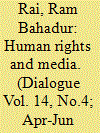

|
|
|
|
|
| Publication |
2013.
|
| Summary/Abstract |
The role of human rights in the modern world has expanded. This is in
response to the need of the times. The human rights issues are becoming
crucial to human society. Numerous international treaties and
conventions have been formulated and signed to preserve and secure
these rights. Many important conferences have helped in defining the
contours of these rights. These have led many countries to adopt them
through legislative and constitutional measures. India has also set up a
Human Rights Commission, which is an active and vibrant entity
|
|
|
|
|
|
|
|
|
|
|
|
|
|
|
|
| 15 |
ID:
122439
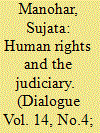

|
|
|
|
|
| Publication |
2013.
|
| Summary/Abstract |
1. Justice Louise Arbor, the former UN Commissioner for Human Rights
in her address at the opening of 61
st
session of the Commission on
Human Rights emphasized the role of the Judiciary in the enforcement
of Human Rights. She said, "Courts the world over have been playing
an increasingly vital role in enforcing social and economic rights,
bringing them from the realms of charity to the reach of justice, linking
them and developing a body of ever-growing jurisprudence by which
we can be guided in bringing these vital rights to the reality of peoples'
lives". In order to understand the impact of international law, and in
particular, international human rights law on judicial decision-making,
one needs to look at the ways in which public international law has
affected decision-making in several jurisdictions around the world.
|
|
|
|
|
|
|
|
|
|
|
|
|
|
|
|
| 16 |
ID:
131442
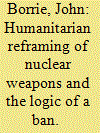

|
|
|
|
|
| Publication |
2014.
|
| Summary/Abstract |
The achievement of past international treaties prohibiting anti-personnel mines and cluster munitions showed that unpropitious political situations for dealing with the effects of problematic weapons could be transformed into concrete, legally binding actions through humanitarian-inspired initiatives. Although there is now renewed concern about the humanitarian consequences of nuclear weapons, some policy makers dispute the relevance of these past processes. This article examines how and why cluster munitions became widely reframed as unacceptable weapons, and the nature and significance of functional similarities with contemporary efforts of civil society activists to instigate humanitarian reframing of nuclear weapons and promote the logic of a ban treaty in view of its norm-setting value among states. In the case of cluster munitions, the weapon in question was signified as unacceptable in moral and humanitarian law terms because of its pattern of harm to civilians with reference to demonstrable evidence of the consequences of use. Ideational reframing was instigated by civil society actors, and introduced doubts into the minds of some policy-makers about weapons they had previously considered as unproblematic. This is relevant to the current discourse on managing and eliminating nuclear weapons in the Nuclear Non-Proliferation Treaty, in which there is dissonance between the rhetoric of those states claiming to be responsible humanitarian powers and their continued dependence on nuclear weapons despite questions about the utility or acceptability of these arms.
|
|
|
|
|
|
|
|
|
|
|
|
|
|
|
|
| 17 |
ID:
157507


|
|
|
|
|
| Summary/Abstract |
The International Criminal Court (ICC) is responsible for prosecuting crimes against humanity, war crimes, and genocide. Despite the potential for the ICC to deter human rights abuses, scholars and policy makers are divided on the effectiveness of it. This debate, however, is plagued by some important theoretical and empirical limitations. I address the problems in the literature and evaluate whether the ICC can prevent human rights abuses. I argue that the ICC can deter governments from committing human rights violations by imposing a variety of costs on them throughout their investigations that decrease their expected payoffs for engaging in human rights abuses. Across a variety of statistical estimators that account for standard threats to inference and several anecdotes, I find strong support for my theoretical expectations; leaders from states that have ratified the Rome Statute commit lower levels of human rights abuses than nonratifier leaders.
|
|
|
|
|
|
|
|
|
|
|
|
|
|
|
|
| 18 |
ID:
160533
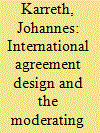

|
|
|
|
|
| Summary/Abstract |
Much of international cooperation research has long assumed that building and deepening (i.e. institutionalizing) international agreements can substitute for weak domestic bureaucratic capacity when it comes to promoting cooperative policies between countries. Qualifying this assumption, we argue that domestic bureaucracies are a key piece of international cooperation: the cooperation-inducing effect of international institutions is conditional on the quality of domestic bureaucracies. We examine this relationship in the context of the politics of interstate cooperation over transboundary rivers, an important test case given concerns about looming water conflict in the face of increasing water scarcity. Using data on freshwater-related events, 1984–2006, on the level of institutionalization of river treaties, and on the quality of domestic bureaucracy, we find that domestic bureaucracies moderate the ability of international institutions to elicit cooperative interstate behavior. The finding is robust to a multitude of specifications and provides important implications for institutional research and policy approaches to cooperation problems beyond freshwater.
|
|
|
|
|
|
|
|
|
|
|
|
|
|
|
|
| 19 |
ID:
157901
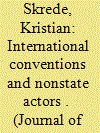

|
|
|
|
|
| Summary/Abstract |
Whether international humanitarian norms are respected during and after civil conflict depends on the behavior of both governments and nonstate actors (NSAs). However, international conventions on the protection of civilians generally do not address NSAs, as such conventions are open only to the representatives of states. In a pioneering initiative, the nongovernmental organization Geneva Call has started to address this problem by soliciting NSAs to sign “deeds of commitment” to ban particular activities violating humanitarian norms. Focusing on the case of antipersonnel mines, we examine why NSAs would choose to sign conventions that limit their autonomy, and whether such conventions can change the behavior of governments and nonstate armed groups. We propose a game-theoretic model of how the interaction between governments and NSAs shape their incentives to commit to and comply with international humanitarian norms. Our empirical evidence highlights the importance of these interdependencies between governments and NSAs in the realm of humanitarian engagements.
|
|
|
|
|
|
|
|
|
|
|
|
|
|
|
|
| 20 |
ID:
163442


|
|
|
|
|
| Summary/Abstract |
Which countries are likely to be ignored for their human rights abuses? This article focuses on one particular way that cases of human rights abuse might be overlooked by human rights organizations (HROs): the relative visibility of the state’s abusiveness vis-à-vis its geographic and social peers. HROs are more likely to target abusive states that are located in regions with more HRO resources and/or are surrounded by states that demonstrate higher respect for human rights, as these abuses will stand out much more clearly. Further, human rights treaties can be used by abusive states as a form of strategic “social camouflage,” with states trying to minimize the risk of HRO attention by ratifying human rights treaties to look more like their rights-respecting peers. Using a cross-national time-series research design, this article finds much support for the argument: abusive states that “join the chorus” avoid HRO attention.
|
|
|
|
|
|
|
|
|
|
|
|
|
|
|
|
|
|
|
|
|